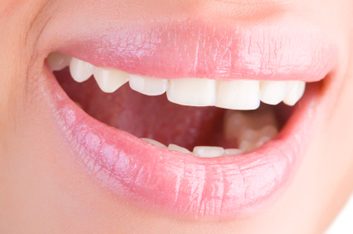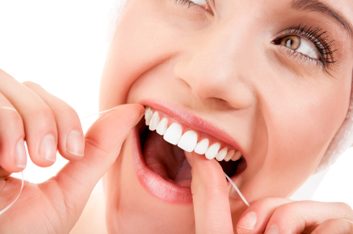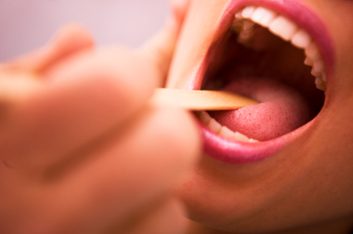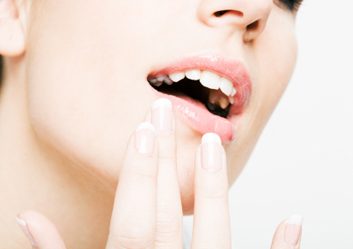
Pssst: Is your mouth trying to tell you something?
The state of your teeth, gums, tongue and breath can offer valuable insights into your dental, oral and overall health, says Dr. Don Friedlander, president of the Canadian Dental Association (CDA). Here are some health conditions your mouth may be trying to bring to your attention.

1. If your gums are sore, inflamed or an odd colour…
Your mouth might be saying: You’ve got gingivitis.
“The warning signs of gingivitis are puffy gums, traces of blood on your toothbrush or a change in the colour of your gums-but it’s often not painful,” says Dr. Friedlander.
“Gum disease is one of the main reasons why adults lose their teeth. But the good news is, it can be treated and can even be reversed in its early stages,” says Dr. Friedlander. See your dentist-pronto.

2. If your teeth are sensitive to hot, cold or sugar…
Your mouth might be saying: Yikes! You have a cavity, fracture, worn-out tooth enamel, exposed root or infection!
“Heat sensitivity usually indicates the pulp is infected,” says Dr. Friedlander.
“Cold sensitivity indicates pulpal inflammation. It may also be caused by a history of decay or restoration in close proximity to the pulp, by a restoration failure, and especially by bruxism-grinding or clenching-to name a few other things.
“Sensitivity to sugar indicates exposed dentin, which typically arises through decay, worn-through enamel or exposed roots,” says Dr. Friedlander.
Upshot: see your dentist. You could need a root canal-or (cross your fingers) just a simple, in-office fluoride-gel treatment.

3. If your gums bleed when you floss…
Your mouth might be saying:
• Don’t be so rough!
Overly aggressive flossing can cause bleeding. Ease up. Ask your hygienist to walk you through proper flossing technique at your next check-up. Or visit the CDA’s tutorial on flossing.
or
• You have gingivitis!
Make an appointment with your dentist to rule this out, or to start treatment. It’s totally reversible if caught early enough, says Dr. Friedlander.

4. If your jaw’s really sore…
Your mouth might be saying: You have a temporomandibular disorder (TMD).
“In most cases of TMD, stress is a major factor,” says Dr. Friedlander. You may be compulsively clenching your jaws or grinding your teeth.
In other cases, facial injury, diseases such as rheumatoid arthritis, or an improperly growing jaw can lead to TMD.
See your dentist. He or she will examine you and take X-rays, then either suggest a treatment plan (which may include dental work, medication, a bite plate, surgery or physiotherapy), or refer you to another specialist.
Don’t panic: “Almost all TMD patients get better,” says Dr. Friedlander.

5. If your mouth or tongue has sores, lumps or white or dark-red patches…
Your mouth might be saying: See your dentist ASAP: It could be cancer.
Oral cancer can be indicated by any of the above symptoms, as well as “changes in the texture or colour of the mouth tissues; bleeding or numbness in the mouth; difficulty swallowing; or changes in taste or tongue sensation,” says Dr. Friedlander.
See your dentist immediately. He or she may order imaging tests (i.e., X-rays, ultrasound, CT scans or MRIs), a biopsy and, if warranted, chemotherapy, radiation therapy and/or surgery.
Tip: You can cut your risk of developing oral cancer by avoiding tobacco, limiting alcohol, eating well and using lip balms with sun protection.

6. You have bad breath…
Your mouth might be saying:
• Improve your dental hygiene.
Left-over food particles turn your mouth into a bacteria grow-op-leading to bad breath. “It’s important to brush and floss your teeth regularly. Brushing your tongue will also help you fight bad breath,” says Dr. Friedlander.
• Eat some carbs.
Bad breath is associated with low-carb, “ketogenic” diets like Atkins. These diets may help you lose weight (for now, anyway), but they can also add an unpleasant edge to your breath.

7. You develop white spots on your teeth…
Your mouth might be saying:
• In adults: You’re a mouth-breather.
“On adult teeth, this most often indicates desiccation of enamel,” says Dr. Friedlander. See your dentist.
• In children: Too. Much. Fluoride.
“When white specks appear on a child’s teeth it’s often the result of a child getting too much fluoride,” says Dr. Friedlander-a condition called dental fluorosis, which is usually mild and barely visible. “Dental fluorosis isn’t health threatening-it’s mainly cosmetic. In more severe cases, it can be easily treated by the dentist,” says Dr. Friedlander.
Related:
• 5 reasons why oral care matters
• Dental symptoms you should never ignore
• What your toothbrush wants you to know
